In most US states, as well as in other countries around the world, car inspections are required at various points in ownership. Unless you take your car in for specific service or diagnostics regularly, you may not know what parts of inspection it will (or won't) pass. Knowing what to expect—and what things can make your car fail—is crucial. We've done the research so you can be prepared when it's time for your vehicle's next inspection.
Common reasons for failing a car inspection include:
- The check engine light is on.
- Dirty oil is causing pollutants to build up.
- The battery has been disconnected recently.
- Your car's computer was just reset.
- There are broken taillights, headlights, reflectors, or turn signals
- The windows have tinting that doesn't meet state requirements.
- Your catalytic converter is bad.
- The ignition timing is wrong.
- Your gas cap is faulty.
- An internal onboard diagnostic computer monitor is not ready.
- The car has broken mirrors or glass.
- The bumper is torn off or damaged.
- Your speedometer doesn't work.
- Your tires are not properly inflated or are damaged.
- The windshield wipers are faulty.
- The vehicle is leaking any type of fuel.
Yes, there's a lot that can interfere with your ability to drive safely—and legally. The good news is, we'll explain each of these issues in depth so you can be prepared when inspection time arrives. Plus, we'll go over how you can remedy some of the common problems that result in a failing grade for your car.
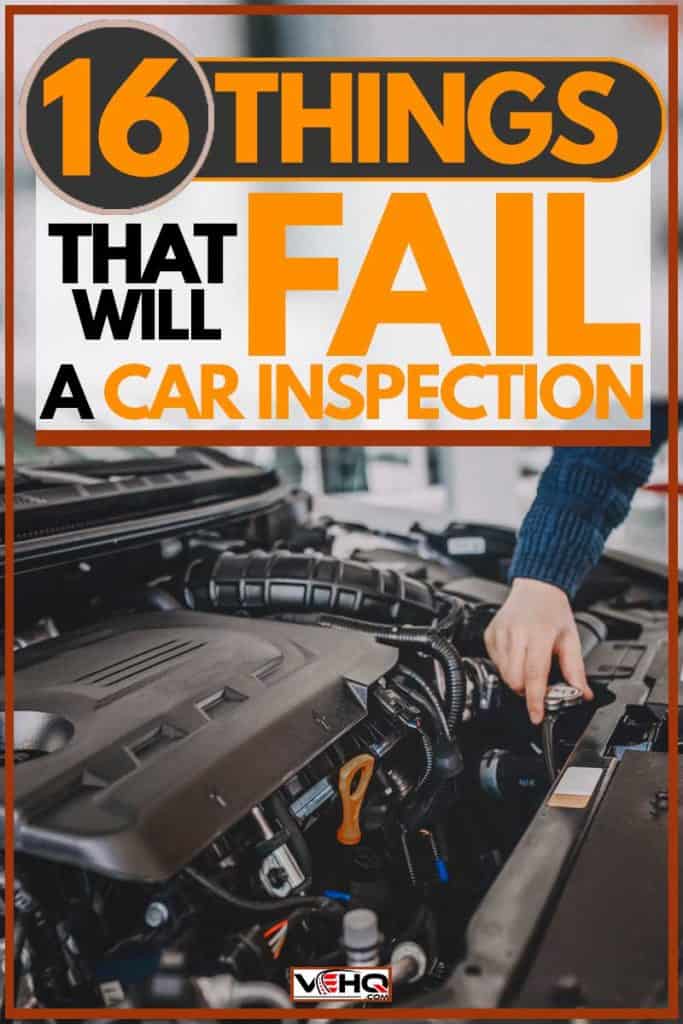
What Can Cause Your Car to Fail an Inspection?
Requirements for inspections vary by state, which means something that causes a car to fail in Texas might not be an issue in California. Here we'll discuss each state's specific inspection criteria—and what types of problems will cause the automobile to fail.
What Things Fail a Car Inspection in California?
The state of California focuses on emissions when it comes to automobiles. To keep pollution down, cars must pass a smog inspection. Therefore, if your car has a lot of emissions—think a cloud of smoke billowing out when you start it—it could fail the inspection.
But smaller, less noticeable things won't slip past smog technicians. You might be able to drive your car with the check engine light on. But with it on, the car won't pass smog. The fix for this is usually a faulty oxygen sensor, though other issues can be a factor, too. If the issue is ongoing, it could mean you need to replace the catalytic converter, which is far more costly than a hundred or so dollars for the sensor.
A check that shows too many pollutants is another issue. Remedying this could be as simple as changing the oil and filter, getting the gunk out of your vehicle's system. But make sure whatever service you have, you drive the car for two weeks without unplugging the battery or resetting the onboard computer.
Doing that will mean a wiped system, and the smog techs can't pull the information they need—resulting in automatic failure.
Which Problems Could Cause a Car to Fail a Texas Inspection?
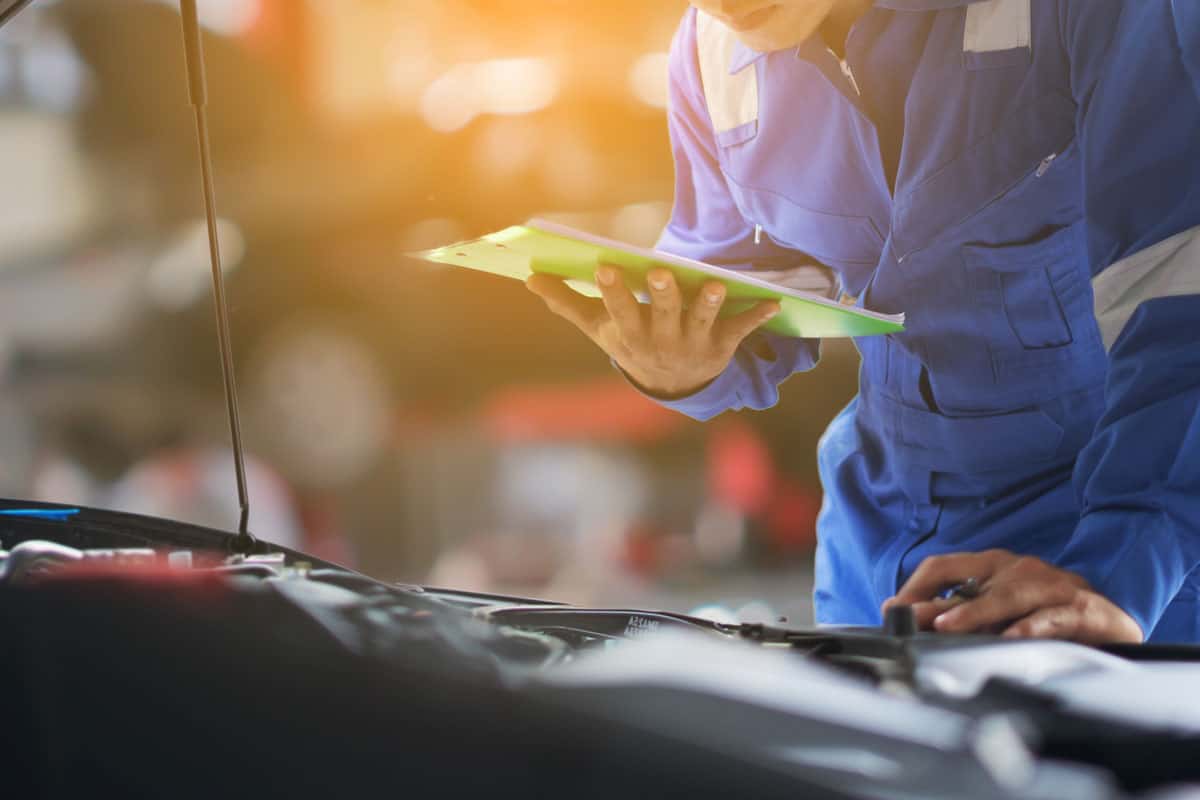
Texas does both safety and emissions inspections. The yearly safety inspection checks everything from the horn to the windshield wipers to your seatbelts. Make sure your brakes, tires, and all your turn signals and lights are in working order, or the car won't pass.
You'll also need to ensure that your license plate lamp is functional and that your exhaust system runs correctly. Even window tint that doesn't adhere to state standards will cause the vehicle to fail a safety inspection.
You might need to remove the offending tint before you can pass the inspection. Replacing bulbs, inflating (or replacing) tires appropriately, and installing new windshield wipers are also common fixes for meeting safety inspection requirements.
In some places, Texas drivers must take their autos to another test that checks emissions. The On-Board Diagnostic (OBDII) test checks your onboard computer for system readiness. The Texas Department of Public Safety says that failures can happen on the test due to faulty gas caps, catalytic converter failure, incorrect ignition timing, and improper gasoline metering.
The fixes for those scenarios range from the purchase of a new gas gap to the replacement of that expensive catalytic converter.
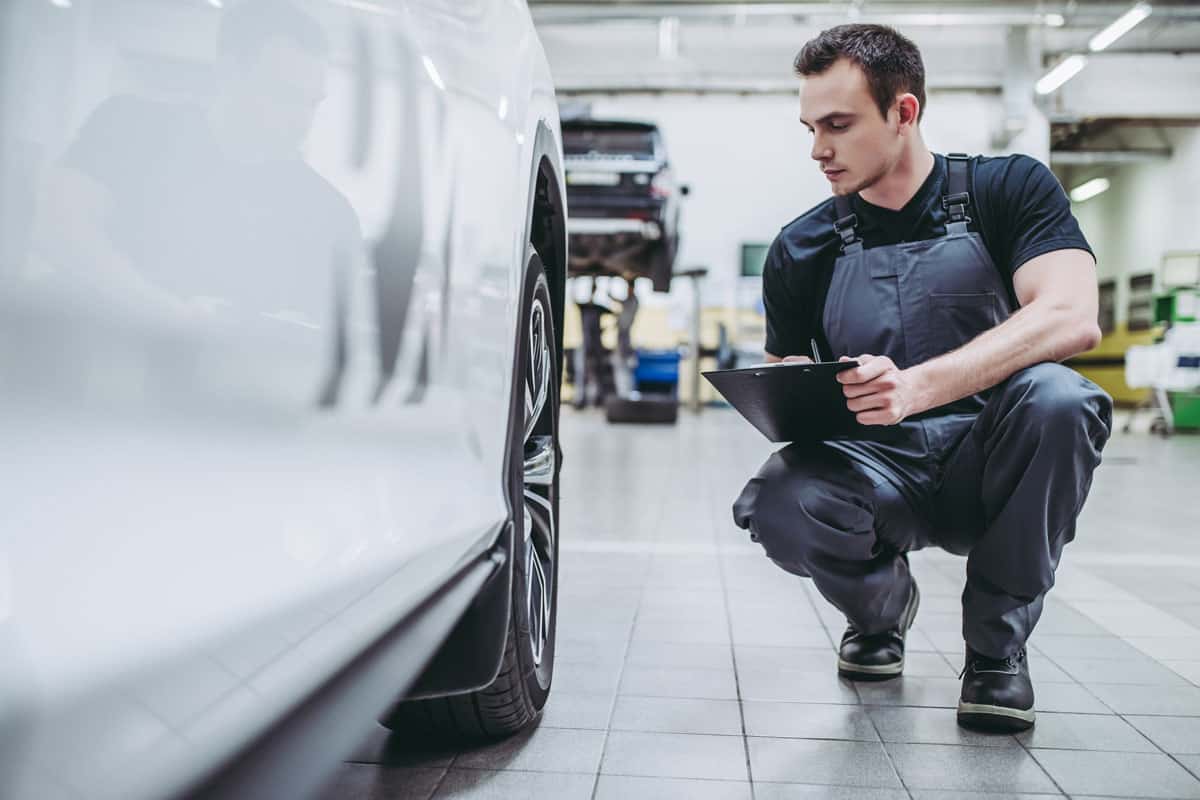
What Can Cause a Car to Fail an Inspection in Pennsylvania?
Pennsylvania doesn't offer much official information on what its inspection requirements are. However, they do use OBD systems like Texas does. That means your technician will be pulling data from the automobile's computer to determine if it's roadworthy.
A check engine light that stays on or a monitor in the OBD system that shows "not ready" (has a malfunction) is cause for failure. Fixing these issues can mean replacing sensors, but it's best to get an expert opinion before ordering parts.
The safety inspection in Pennsylvania involves a thorough check of a long list of vehicle systems. Your car must have good brakes, wheels and tires, functional lights, undamaged rearview mirrors, working speedometers and odometers, intact bumpers, and many other safe and functional components.
What Can Cause a Car to Fail an Inspection in New York?
New York requires safety and emissions inspections that check everything from unapproved window tint to unsafe tire tread depth to the possibility of fluid leaks. A check engine light on, fuel leaking from the automobile or a "not ready" OBDII reading can mean your car doesn't pass the inspection.
How Often Do You Need a Vehicle Inspection?
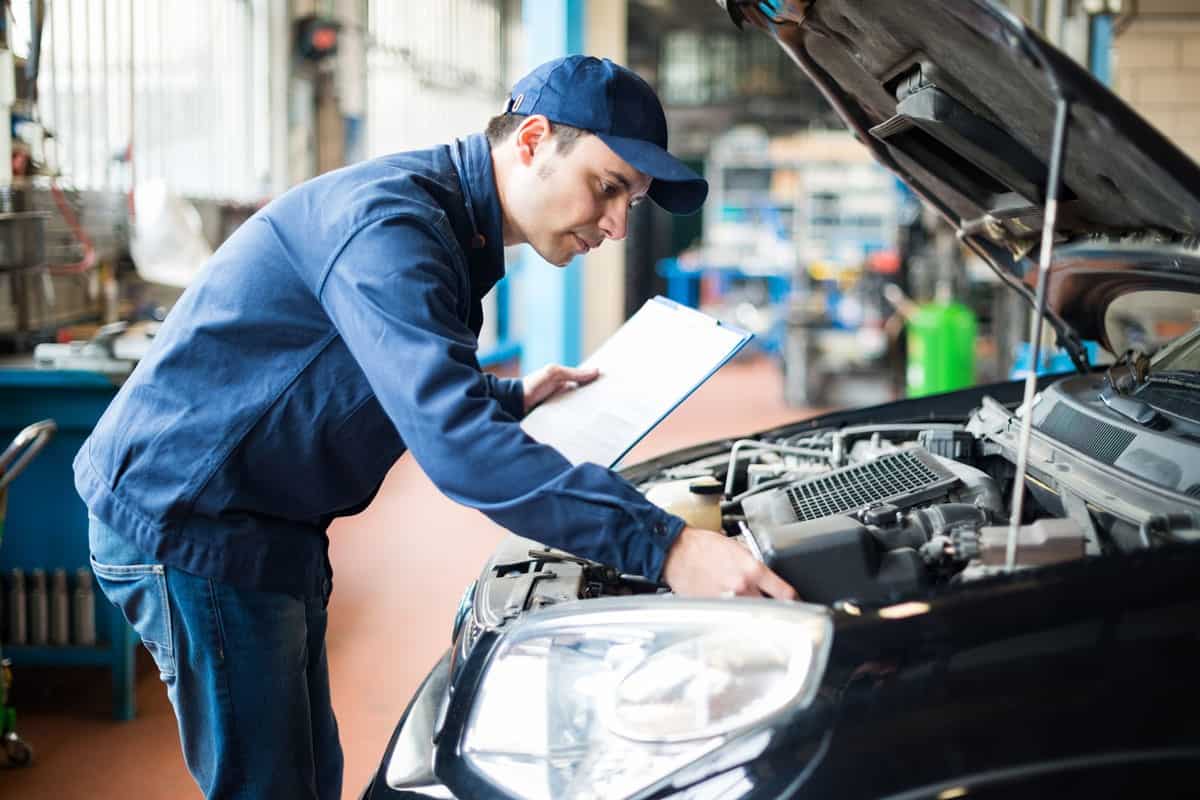
Each state has its own rules on when and how your vehicle must be inspected. In general, you will need whatever inspection your state requires if you're selling your automobile. You must also adhere to the guidelines on such checks to keep your vehicle registered—many states send out inspection notices with your registration documents.
In California, for example, most vehicles must pass a smog check upon transfer, and it's the responsibility of the seller to fix any issues that come up. So, your vehicle has a smog check out of the factory and anytime you sell or transfer it. In some counties, though, a biennial smog check is required by law on all vehicles.
Texas vehicles must undergo a safety inspection annually. Plus, emissions testing is required in 17 counties across the state on a yearly basis, too. Florida has no inspection requirements at all, whether for safety or emissions.
In Pennsylvania, vehicles must have yearly emissions and safety inspections. New York's inspections are once per year and cover essential vehicle safety and emissions.
Exemptions from Vehicle Inspections
Many states have specific guidelines on which vehicles require inspections. In California, gas-powered vehicles that were manufactured before 1976 don't ever need a smog check. Pre-1998 diesel cars and trucks don't need inspections, either.
Of course, every vehicle in Florida is exempt since the state did away with testing in the '90s.
Where Can You Get Your Vehicle Inspected?
Each state handles inspections differently. Some state that only specially licensed facilities may provide services, while others provide listings without recommendations.
California provides drivers with a list of licensed smog check facilities in the state with a California station search tool. Three types of facilities are available: Test-Only, Test-and-Repair, or Repair-Only.
There's a search tool for Texas inspection stations, too, with listings throughout each county. Pennsylvania's inspection station offerings range by region, but the Drive Clean Pennsylvania website lists the info you need to find an inspection center near you.
New York directs residents to inspection stations all over the state. You can have your vehicle checked over at a Public Vehicle Inspection Station or at a place that handles junk and salvage vehicles. Repair shops and dealers are also qualified to provide such services.
How Much Does a Full Inspection Cost?
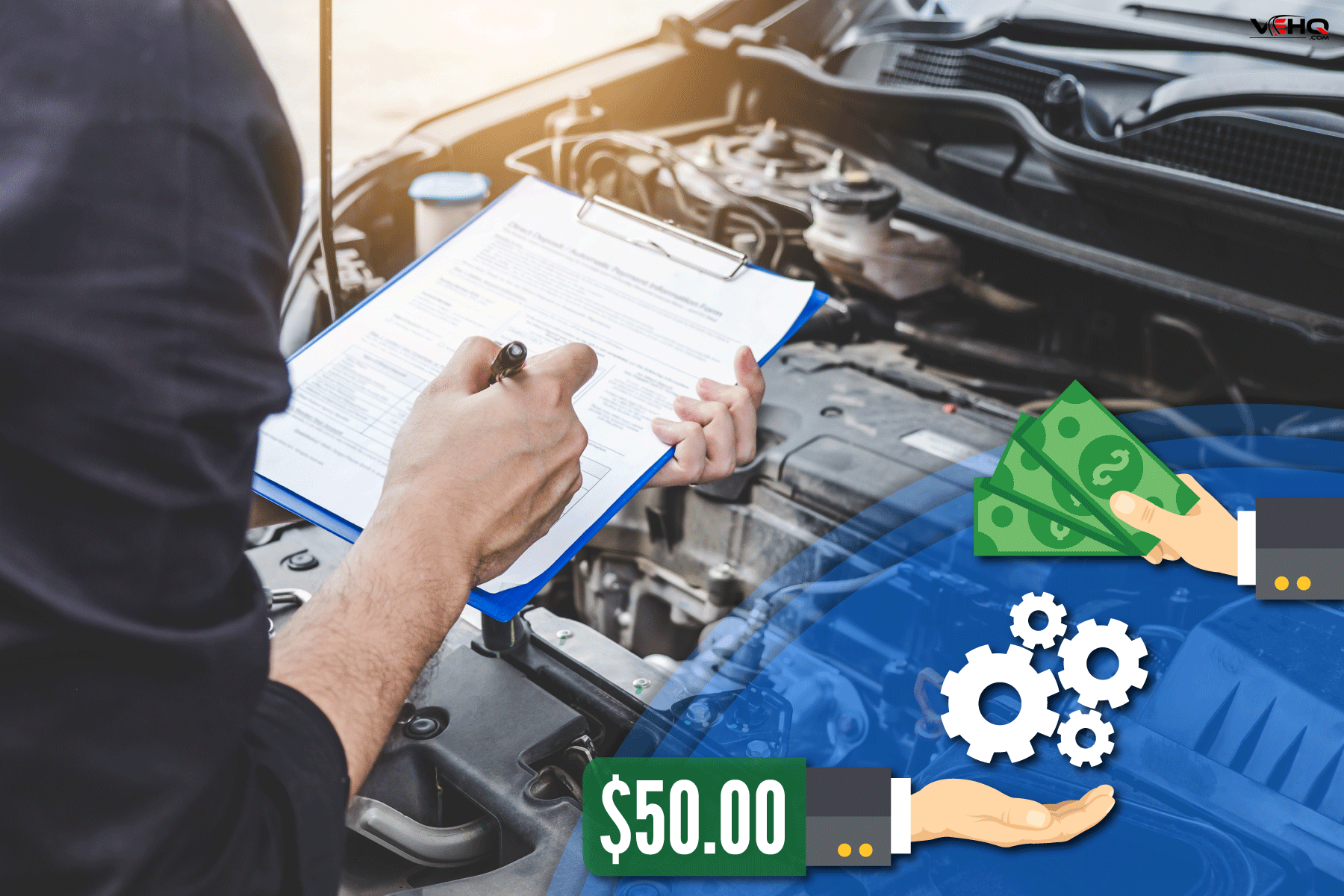
In California, rates for a smog check can vary widely. Some shops perform them for $50.00—or for a lower price if the vehicle doesn't pass—while others may charge $100 or more regardless of the outcome.
In Texas, a yearly safety check costs $7.00, while a safety plus emissions check ranges from $18.50 to $25.50, depending on the county. New York inspections are $10 for safety inspections and between $11 and $27 for emissions testing, depending on which facility you visit.
Pennsylvania doesn't regulate the pricing for inspections. They suggest that rates will vary widely. Some shops offer inspection appointments for a flat $30.00 fee.
Want to know more? Read our post on how much a full car inspection costs.
How Long Does a Complete Vehicle Inspection Take?
The length of your vehicle inspection appointment can range from half an hour to a few hours. Depending on your state, county, and the facility you choose, an inspection may involve some time waiting in a queue, too.
But in general, a vehicle inspection shouldn't take more than a few hours. You should not have to leave your car overnight—unless you're scheduling repairs immediately afterward.
What Happens If You Fail Your Car Inspection?
If your car fails an inspection in any state, that typically means you cannot transfer it, so selling it is not possible. Repairs are necessary to restore it to operating condition, but each state has specifications for repairs, too, to ensure safety and quality.
What if Your Car Fails an Inspection in California?
In California, if you take your vehicle to a Test-and-Repair or Repair-Only station, the mechanic there can advise you on any repairs necessary to pass the inspection. DMV doesn't give any guidance on the matter, however, and their website directs consumers to their trusted automotive shop for answers.
The California Bureau of Automotive Repair (BAR) also runs a buyback program to get vehicles off the street if they don't pass smog. This option is helpful if you're aiming to sell an older vehicle, as it can get you up to $1,000 for the trade-in. After all, you won't be able to transfer or sell the car otherwise (unless you're giving it to a family member and are therefore exempt).
What if Your Car Won't Pass Inspections in Texas, Pennsylvania, or New York?
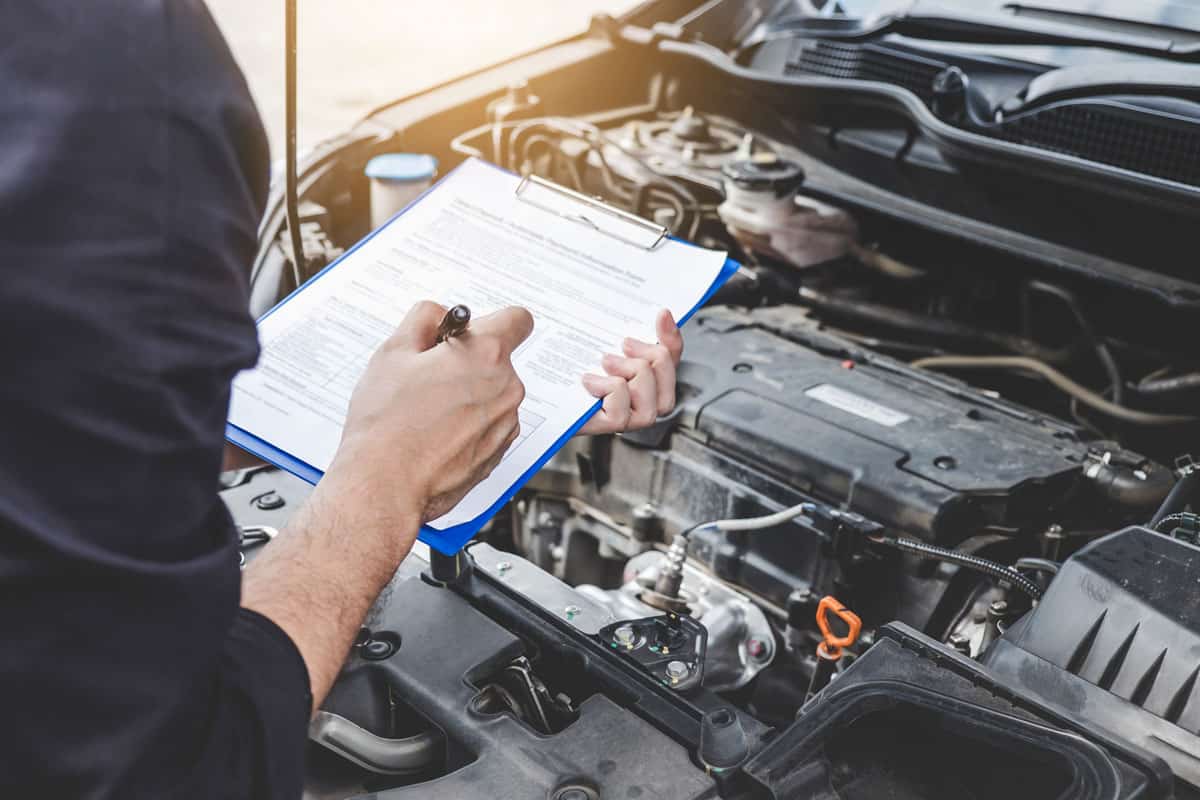
Texas provides a search tool for Texas repair programs, too. You can also apply for a waiver to the inspection requirement if your vehicle doesn't pass even after repairs are made. The catch is that the waiver only applies if the work is done at an approved facility.
States like Texas, Pennsylvania, and New York won't allow you to renew registration documents without passing inspection. In New York, you could also wind up with a parking ticket for not addressing the issue.
Wherever you're driving, it pays to know the local laws and regulations on inspections. Keep that in mind if you plan to buy an out-of-state vehicle—or bring your car along when you move across the country.

I changed the battery on my car without hooking up a memory saver a few weeks ago. My car failed inspection last week. I drove over 140 miles since and still failed inspection. What can I do?